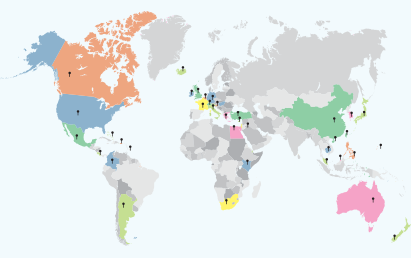
This issue of FTM marks the one-year anniversary of swift and radical changes—and they are not over. You have had a tiring, challenging, and undoubtedly frustrating year. Balancing home and work are difficult but that took on an entirely new effort over the last 12 months. Despite 2021 having glimmers of potential difference, with prognosticators suggesting we may be back to some normalcy by year’s end, the fact is we are all in for another round of major transitions and adaptations. On top of still needing to wear masks, social distance, and avoid crowds, we will need to navigate vaccinations, kids returning to school, new and changing work environments. Uncertainty.
Regardless of the unpredictability, this year seemingly has more optimism with the news we are hearing. Yet, the enduring questions are, “How do we make it through another year of constant change and transition?” “How will we deal with the daily ambiguity and insecurity?” “Will there be a breaking point for everyone if, for example, we have another natural event creating disaster on par with, or worse than, the recent freeze out in Texas?”
Simply, we survive and thrive through community, hope, and resiliency.
To that end, AAMFT will continue to provide platforms where members can help members with resources and offer a community of promise and resilience. In February, AAMFT’s interest network, Margins to Center: Cultural Connections Among Couples and Marriage and Family Therapists offered a free series, The Black Family: Representation, Identity and Diversity. Therapists shared insights from past cases, professional anecdotes, and personal reflections. I appreciate the efforts of the Margins to Center network in helping AAMFT offer this support and educational opportunity to members.
AAMFT also hosted a one-hour presentation at the Department of Veterans Affairs (VA) regarding career opportunities for MFTs to be employed as VA providers. The presentation discussed the VA’s role in providing behavioral healthcare and offered resources to members who are providing care to Veterans outside the VA.
The Leadership Symposium was offered at discounted rates and over 110 members attended. Members who are experiencing the same challenges as society stepped up to help with programming with sessions such as:
- How to be a Leader and Build a Successful Private Practice
- Shifting Power to Create Collaborative, Inclusive Leadership
- Write Now: Expand Your Career Through Writing and Becoming a Media Source
- Motivational Interviewing in MFT Leadership and Organizations
- Balancing Roles: Addressing Power and Privilege as a Leader
- I’m an MFT in a Community Mental Health Agency, Help!
Coming up this spring we have scheduled free At Home presentations with Chloe Madanes, Maurizio Andolfi, Linna Wang, and DoHee Kim-Appel and Johnathan Appel.
And looking forward this year, AAMFT will be launching the Systemic Family Therapy Conference (SFTC). Certainly, I wish we could have held an in-person inaugural event, but the circumstances did not allow such planning. For this brand-new event, AAMFT in its role as founding sponsor, will be significantly subsidizing registration costs for all AAMFT members to reduce barriers to attending. Registration for AAMFT Professional members will be offered at a 75% discount and Student members will be able to attend for free. Learning from last year’s 3,000+ attendees, we are very excited about hosting this year’s virtual SFTC. The networking opportunities and educational content will be sure to dynamically refresh and enhance while offering a strong sense of community. And, with a little luck, maybe we will be experiencing a more hopeful set of circumstances.
AAMFT’s efforts in advocacy are certainly setting a rapid pace and providing MFTs throughout the U.S. hope and optimism. Achievements this year already include:
- In January, MFTs in Medicare bill was introduced in the House of Representatives which is the earliest introduction ever by Congress on this legislation.
- AAMFT members (and some non-members!) sent over 1,200 e-mail messages to Members of Congress when asked to help with our federal advocacy efforts.
- In Montana, we are close to officially including MFTs in Medicaid due to excellent advocacy work from our Montana leaders and members.
- Legislation that would include diagnosis in MFT scope of practice has unanimously passed the Indiana Senate.
AAMFT will continue to work hard to advance and protect the profession and practice of marriage and family therapy. We will continue to work at fulfilling the role as the premier association of information and resource for you during the challenges we are facing today, and any that may lie ahead. AAMFT will make every effort to provide you a professional home complete with possibility and support. To accomplish these objectives, AAMFT seeks your assistance. I trust you will please take the time to consider some of the possibilities:
-
- Becoming a lead on the Family TEAM
- Joining an Interest Network
- Volunteering for a leadership position within AAMFT Networks
- Answering Calls to Action when there are legislative needs
- Running for an elected position within AAMFT— Board of Directors, COAMFTE, or Elections Council
- Contributing your skills and expertise that advance and promote systemic family therapy through blogs and articles
Speaking of community, I want to take a moment to applaud the hard work, courage, and contributions from our authors helping with this issue’s theme of Working with Trans Clients and Their Families. I offer a big shout out to each and every author for sharing their knowledge and experience in an area where MFTs need vital knowledge and education.
Conversations, community, and collaboration are mainstays of hope and resiliency. This issue of FTM is the first on our new digital platform. This platform provides AAMFT members the opportunity to share and discuss many of the presented topics, learn from others, and reach out for support and resources. I anticipate that you take time to explore the many functions of this new interactive experience.
Members helping members is what healthy associations strive for, nurture, and sustain. It takes courage to seek community and resources; and it takes compassion to provide assurance and support. AAMFT members have long understood these dynamics and exemplified an abundance of care and kindness during these troubled times. Please do not hesitate to reach out if you need support—AAMFT is your professional home. If you are able, please do not hesitate to offer support to your colleagues—it just might be the most important professional action you take in 2021.
In 2020, AAMFT members rose to the challenges and supported not only each other, but so many in our communities and networks. I have no doubt 2021 will be a repeat in building community, hope, and resilience.


